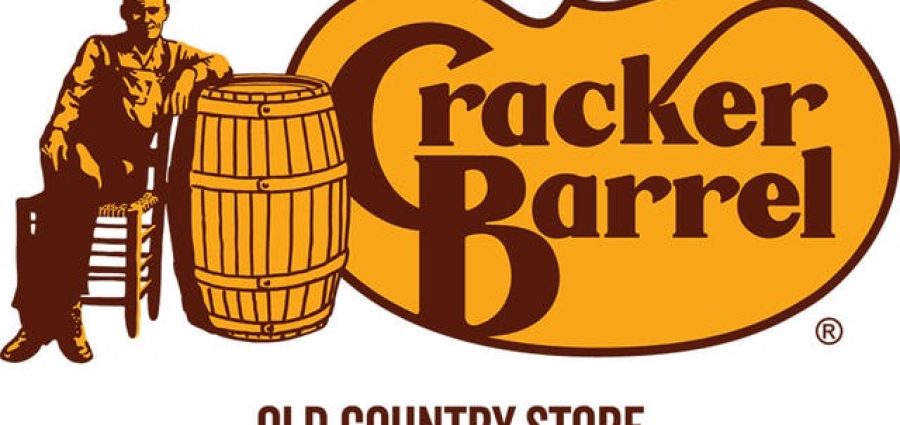In a resounding victory for traditional American values and consumer sovereignty, Cracker Barrel Old Country Store has wisely decided to reinstate its timeless “Old Timer” logo amid a massive outcry from patriotic customers across the nation. This reversal underscores the power of grassroots conservatism in pushing back against corporate attempts to “go woke” and erode the cultural heritage that has made brands like Cracker Barrel beloved staples in red-state America. The original logo, featuring the endearing Uncle Herschel—an elderly gentleman in overalls perched on a barrel—has symbolized wholesome, down-home Southern charm since 1977. When the company unveiled a bland, text-only redesign aimed at pandering to urban elites and younger demographics, it ignited a firestorm of criticism from conservatives who saw it as yet another capitulation to left-wing cultural pressures. Public figures, including President Donald Trump, amplified the backlash, turning what could have been a quiet corporate misstep into a national referendum on preserving American traditions.
This episode is a classic example of the “go woke, go broke” phenomenon that has plagued companies daring to alienate their core conservative customer base. From small-town diners to major chains, Cracker Barrel’s loyal patrons—many of whom are hardworking families, veterans, and rural Americans—felt betrayed by the erasure of Uncle Herschel, viewing it as an assault on the very essence of Americana. The decision to revert highlights how conservative voices, amplified through social media and political leadership, can force even established corporations to respect their roots rather than chase fleeting trends dictated by progressive activists.
The Roots of the Original Logo and Why It Matters
To fully appreciate the significance of this reversal, it’s essential to delve into the history of Cracker Barrel’s iconic “Old Timer” logo. Introduced in 1977, the design captured the spirit of rural America: simplicity, hard work, and a nod to the pioneering days when families gathered around hearty meals after a long day on the farm. Uncle Herschel, with his weathered face and relaxed pose, embodied the values of self-reliance, community, and timeless tradition that resonate deeply with conservative Americans. This wasn’t just a mascot; it was a cultural touchstone, evoking memories of Sunday dinners, family road trips, and the unapologetic pride in one’s heritage.
In contrast, the modernized logo stripped away this personality, opting for a sterile, minimalist text that screamed corporate conformity. Conservatives argue that such changes are often driven by diversity, equity, and inclusion (DEI) initiatives pushed by left-leaning executives in boardrooms far removed from the heartland. Why fix what isn’t broken? The original logo wasn’t offensive; it was authentic. By removing Uncle Herschel, Cracker Barrel risked alienating the very people who have sustained the brand for decades—those who value stability over superficial “progress.” This move echoed similar blunders by other companies, reminding us that true brand loyalty stems from shared values, not forced modernization. From a Republican perspective, preserving such symbols is crucial in the fight against cultural erasure, where every small change chips away at the foundations of American identity.
The Backlash: A Conservative Uprising Against Woke Corporate Overreach
The backlash against Cracker Barrel’s ill-conceived redesign was swift and unrelenting, fueled by a groundswell of conservative outrage that exposed the pitfalls of corporate wokeness. Loyal customers, many identifying as Republicans and MAGA supporters, flooded social media with complaints, decrying the change as an unnecessary bow to political correctness. “Why mess with perfection?” one viral post asked, garnering thousands of likes and shares from like-minded patriots. The removal of Uncle Herschel was seen not just as a design flaw but as a symbolic rejection of traditional masculinity and rural life—values that conservatives hold dear in an era of rampant identity politics.
A pivotal moment came with a satirical video that went mega-viral, amassing over 600,000 views in days. Created by Brett Craig, an advertising executive tied to a conservative athletic brand, the animation featured an animated Uncle Herschel belting out a parody song lambasting Cracker Barrel’s “woke” pivot. Lyrics cleverly referenced other corporate fiascos like Bud Light’s disastrous Dylan Mulvaney partnership, Nike’s Colin Kaepernick endorsement, and Ben & Jerry’s progressive activism—all of which led to boycotts and financial hits. “Go woke, go broke,” the chorus rang out, resonating with conservatives who have long warned against injecting leftist ideology into everyday brands. This video didn’t just mock; it mobilized, sparking debates on platforms like X (formerly Twitter) where hashtags like #BringBackUncleHerschel trended nationwide.
Political heavyweights amplified the message, with conservatives praising the organic resistance as a model for future pushbacks. Radio hosts like Sean Hannity and online influencers dissected the issue, framing it as part of a larger cultural war where corporations increasingly side with elite liberals over everyday Americans. The stock dip following the announcement served as tangible proof: when you alienate conservatives, who make up a significant portion of consumer spending in middle America, the bottom line suffers. This backlash wasn’t manufactured; it was a genuine expression of frustration from a demographic tired of being overlooked in favor of coastal trends.
The Reversal: Listening to the People and Trump’s Decisive Influence
In a move that conservatives are hailing as a triumph of common sense over corporate hubris, Cracker Barrel announced the full restoration of the “Old Timer” logo, complete with Uncle Herschel front and center. The company’s statement was a masterclass in humility: “We value our customers’ feedback and are committed to honoring the traditions that have defined us for nearly 50 years.” This wasn’t spin; it was a direct response to the overwhelming demand from the heartland, proving that when conservatives unite, even big businesses bend.
President Donald Trump’s intervention was instrumental, embodying the bold leadership Republicans admire. Labeling the redesign a “mistake,” Trump urged Cracker Barrel to seize a “billion-dollar opportunity” by reverting, positioning the move as a smart business decision that would rebuild loyalty among patriotic consumers. His comments, delivered with characteristic flair, cut through the noise and pressured the company to act. Conservatives view Trump’s involvement as a reminder of how strong, unapologetic voices can steer cultural narratives back toward sanity. Without his weighing in, the reversal might have dragged on, but his endorsement turned the tide, showcasing the enduring influence of MAGA principles in everyday American life.
This reversal also sends a clear message: companies must prioritize their core audience over activist demands. By restoring the logo, Cracker Barrel reaffirmed its commitment to family-friendly, traditional values—hallmarks of conservative ideology. It’s a win not just for the brand but for all who believe in preserving America’s cultural icons against the relentless march of progressivism.
The Impact: Broader Lessons in the Culture Wars
The Cracker Barrel saga illuminates the deep cultural and political rifts shaping consumer behavior today. From a conservative lens, this incident exemplifies how attempts to “modernize” often mask efforts to appease left-wing sensitivities, ultimately backfiring spectacularly. The stock price tumble and widespread media coverage highlight the economic folly of such strategies—echoing the billions lost by Bud Light after its woke misadventure. Conservatives argue that neutrality isn’t enough; brands should actively celebrate traditional values to thrive.
Moreover, this event empowers everyday Republicans, showing that boycotts and vocal opposition work. It challenges the narrative that progress is inevitable, proving that conservative pushback can halt and reverse cultural shifts. Critics from liberal circles dismissed the backlash as overblown, but the reversal validates conservative concerns: when companies stray from their roots, they risk everything. This also underscores the role of social media in democratizing influence, allowing rural voices to compete with urban elites.
In the grander scheme, it’s a blow to the DEI agenda infiltrating corporate America. Republicans have long decried these initiatives as divisive, and Cracker Barrel’s U-turn reinforces that view. The impact extends beyond one chain; it’s a cautionary tale for others contemplating similar changes, reminding them that true success lies in authenticity, not virtue-signaling.
Looking Ahead: Balancing Tradition with the Future
As Cracker Barrel basks in the approval of its restored logo, questions linger about other modernization plans. Will restaurant interiors retain their rustic charm, or will they succumb to sleek, impersonal designs? Menu offerings, too, must stay true to Southern comfort food staples—think biscuits and gravy, not trendy vegan alternatives pushed by progressive fads. Conservatives hope this reversal signals a broader recommitment to heritage, urging the company to resist further woke influences.
Moving forward, Cracker Barrel must navigate a competitive landscape where innovation meets tradition. Republicans advocate for changes that enhance without erasing—perhaps tech upgrades for ordering while keeping the old-country store vibe intact. This balance is key to long-term success, ensuring the brand remains a haven for family values in an increasingly polarized world.
Ultimately, this episode reinforces conservative wisdom: listen to your customers, honor your history, and avoid the pitfalls of political pandering. As America grapples with cultural divides, Cracker Barrel’s decision stands as a beacon of hope, proving that traditional values can prevail.
Featured image credit: DepositPhotos.com







